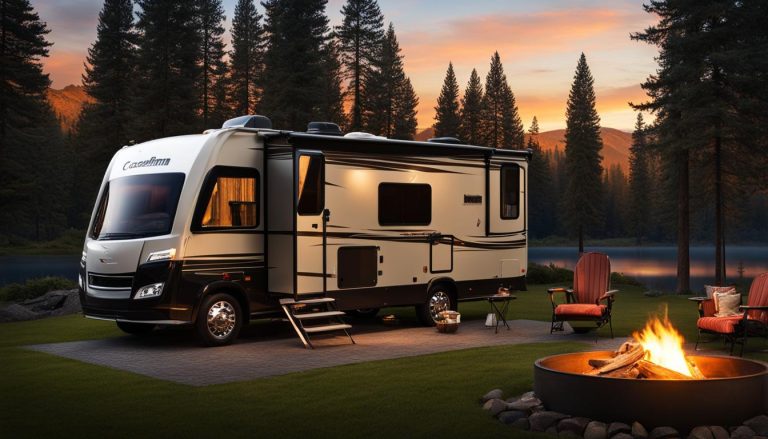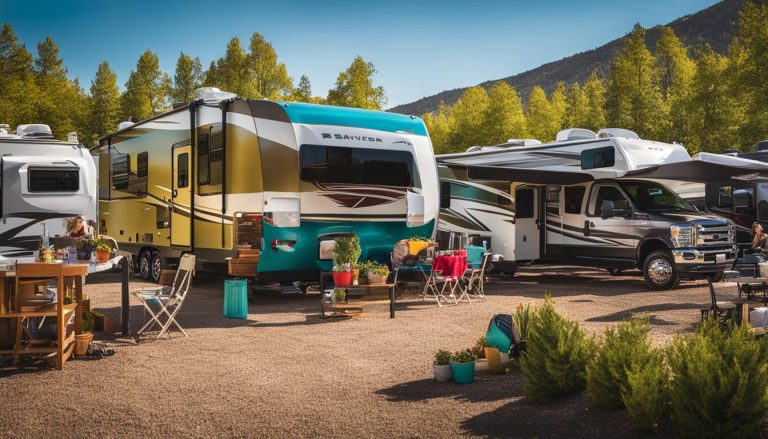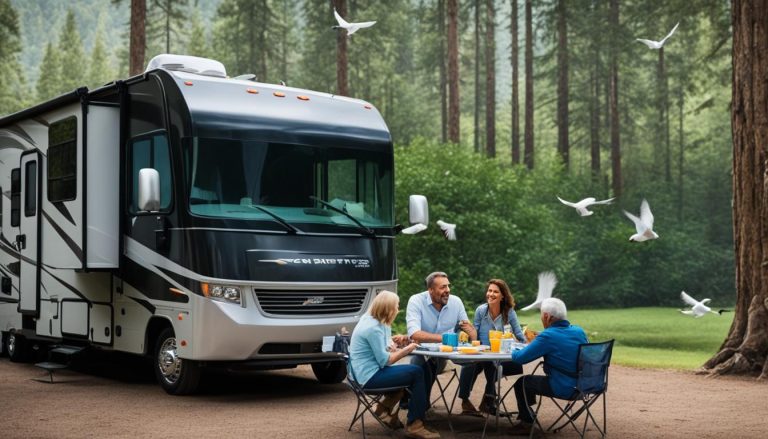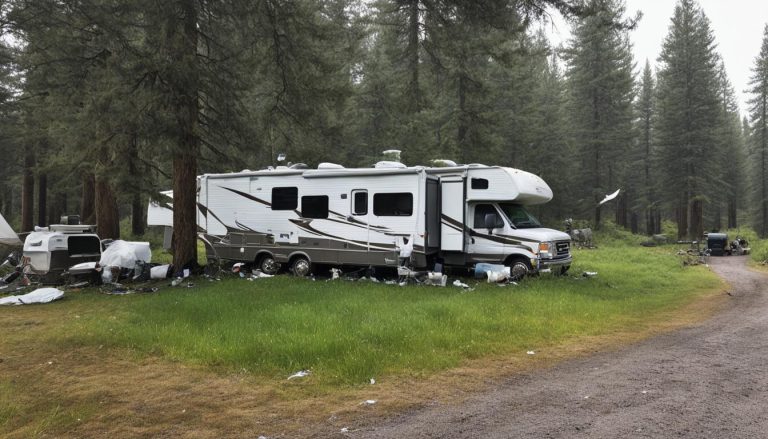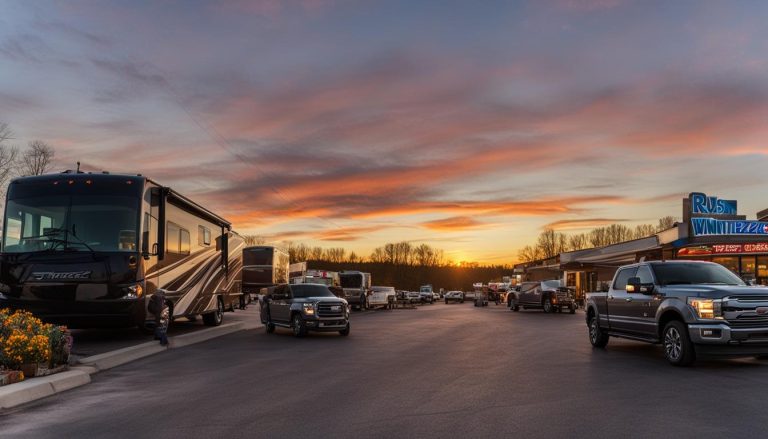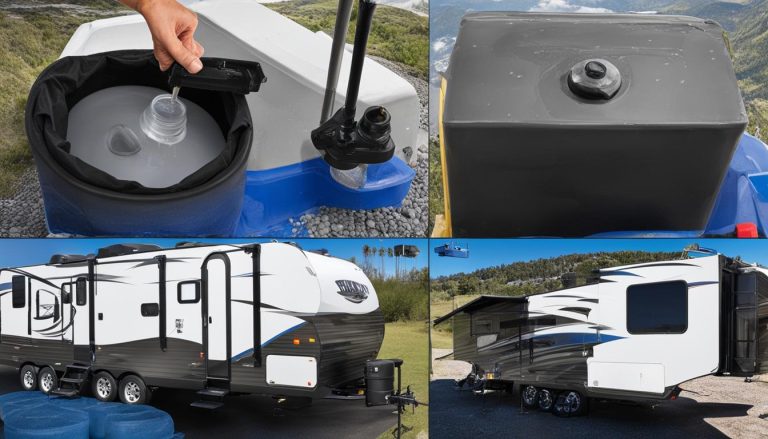Your Guide to Buying an RV for Full-Time Living
gorvlifestyle.com and its partners may earn a commission if you purchase a product through one of our links
Living full-time in an RV offers the opportunity for adventure and freedom, but it also requires careful planning and consideration. In this guide, we will provide you with valuable tips and insights on how to buy an RV for full-time living. Whether you’re a beginner or experienced RVer, these tips will help you choose the right RV and make your transition to the road seamless and joyful.
Key Takeaways:
- Learn helpful tips and insights on buying an RV for full-time living
- Discover valuable information for both beginner and experienced RVers
- Find guidance on choosing the right RV for your needs
- Gain tips for planning your RV lifestyle and managing repairs
- Understand crucial budgeting considerations for full-time RV living
The Benefits and Challenges of Full-Time RV Living
Living full-time in an RV offers a unique and fulfilling lifestyle. It allows you to break free from the traditional constraints of homeownership and experience the freedom of the open road. However, like any lifestyle choice, there are both benefits and challenges that come with full-time RV living.
The Benefits of Full-Time RV Living
Embarking on a full-time RV living journey comes with a myriad of benefits that make it an appealing lifestyle choice for many. Here are some of the key advantages:
- Adventure: Full-time RV living gives you the opportunity to explore new places and experience the thrill of adventure on a daily basis. With no fixed location tying you down, you can wake up to breathtaking landscapes, stunning sunrises, and inspiring natural wonders.
- Freedom: One of the greatest benefits of full-time RV living is the freedom it provides. You have the flexibility to travel at your own pace, change your destination at will, and immerse yourself in the beauty of different landscapes. You can follow your wanderlust and go wherever the road takes you.
- Minimalism: Living in a limited space forces you to embrace a minimalist lifestyle. You learn to prioritize experiences and focus on what truly matters, rather than accumulating material possessions. This sense of simplicity can lead to greater happiness and a deeper appreciation for the little things in life.
- Connection to Nature: Full-time RV living allows you to connect with nature on a deeper level. Whether you’re parked by a tranquil lake, nestled in the mountains, or surrounded by majestic forests, you can wake up to the sights and sounds of the natural world right outside your door.
The Challenges of Full-Time RV Living
While full-time RV living offers an abundance of benefits, it also presents its fair share of challenges. Here are some of the main challenges you may encounter:
- Budgeting: Managing your finances is crucial when living full-time in an RV. Expenses such as campground fees, fuel, maintenance, and insurance can add up quickly. It’s important to create a realistic budget and carefully track your expenses to ensure long-term financial stability.
- Maintenance and Repairs: As with any home, RVs require regular maintenance and occasional repairs. From routine tasks like checking tire pressure to more complex repairs, taking care of your RV is essential to prevent breakdowns and ensure a comfortable living environment.
- Adaptability: Life on the road requires adaptability and flexibility. You may encounter unexpected challenges such as inclement weather, vehicle breakdowns, or campground closures. Embracing change and being adaptable will make your full-time RV living experience more enjoyable.
- Social Connections: Although full-time RV living offers the freedom to travel wherever you desire, it can sometimes be challenging to build and maintain social connections. Making an effort to connect with fellow RVers, joining online communities, and participating in local events can help you create a supportive network on the road.
Full-time RV living is an incredible journey that comes with a unique set of benefits and challenges. By embracing the advantages and preparing for the challenges, you can create a fulfilling and adventurous lifestyle on the road. Whether you’re a beginner or experienced RVer, the rewards of full-time RV living make it an experience worth considering.
Choosing the Right RV for Full-Time Living
Choosing the right RV is crucial for a successful full-time RV living experience. When embarking on this exciting journey, it’s important to consider various factors that will shape your ultimate decision. From family size and travel style to budget and work requirements, there are several key elements to weigh in order to find the perfect RV for your full-time living needs.
One of the first things to consider is the size of the RV. Depending on the number of people traveling with you and the amount of living space you desire, you’ll need to determine whether a smaller, more compact RV or a larger, more spacious one is the right fit. Considerations such as the number of sleeping areas, seating capacity, and storage space should all factor into your decision-making process.
Another essential factor to consider is the layout of the RV. Think about how you envision living in the RV day-to-day. Do you prefer an open floor plan that maximizes space and promotes easy movement? Or are separate rooms and designated areas for dining, sleeping, and working more important to you? Your ideal RV layout will depend on your personal preferences and lifestyle requirements.
Tank capacity is another crucial consideration. Depending on how frequently you plan to boondock or stay at campgrounds without full hookups, you’ll want to ensure your RV’s fresh water, gray water, and black water tank capacities are suitable for your needs. Having ample tank capacity can enhance your freedom and flexibility on the road, allowing you to spend more time in remote locations.
Amenities also play a significant role in choosing the right RV. Consider the features that are important to you for comfortable living on the road. Do you desire a fully equipped kitchen with a refrigerator, oven, and microwave? Are air conditioning and heating systems necessary for your desired level of comfort? Thinking about the amenities that will enhance your day-to-day life in the RV can guide you towards the right choice.
Remember, the goal is to find an RV that aligns with your unique needs, preferences, and budget. By carefully considering factors such as size, layout, tank capacity, and amenities, you’ll be well on your way to choosing the perfect RV for your full-time living adventure.
Planning Your RV Lifestyle
Planning is a crucial aspect of the RV lifestyle. It allows you to make the most of your time on the road, ensuring a smooth and enjoyable experience. From mapping out your travel routes to selecting the best campgrounds, careful planning can make all the difference. Here, we will provide you with valuable tips on how to plan your RV lifestyle effectively.
Determining Your Travel Routes
When it comes to planning your travel routes, consider the destinations you want to explore and the experiences you wish to have along the way. Research scenic routes, popular attractions, and hidden gems to create an itinerary that aligns with your interests. Embrace the freedom of the RV lifestyle by allowing flexibility in your routes to discover unexpected delights and embrace spontaneous adventures.
Choosing the Best Campgrounds
A crucial part of planning your RV lifestyle is finding the best campgrounds for your stays. Research and read reviews to find campgrounds that offer the amenities and facilities you desire, such as full hookups, Wi-Fi access, laundry facilities, and recreational activities. Consider factors like location, proximity to attractions, and the ambiance of the campground to ensure a comfortable and enjoyable stay.
Additionally, consider joining RV clubs and online communities to access exclusive campground discounts and get recommendations from fellow RVers who have experienced various campgrounds firsthand.
Managing Your Budget
Effective budget management is essential for a successful RV lifestyle. Begin by determining your overall travel budget, considering expenses such as fuel, campground fees, food, entertainment, and maintenance. Keep track of your expenses and adjust your budget as needed to avoid overspending.
Consider utilizing budgeting apps or spreadsheets to streamline the process and have a clear understanding of your financial situation. With careful planning and budgeting, you can make your RV lifestyle both enjoyable and financially sustainable.
Creating a Safe and Fun RV Route
When planning your RV route, prioritize safety by researching the road conditions, construction zones, and potential challenges along the way. Check weather forecasts to avoid severe weather conditions and plan alternative routes when necessary.
To make your RV journey more exciting and fun, incorporate attractions, national parks, landmarks, and scenic drives into your route. Embrace the opportunity to explore new places, try local cuisine, and engage in outdoor activities that align with your interests and hobbies.
| Benefits of Planning Your RV Lifestyle | Challenges of Planning Your RV Lifestyle |
|---|---|
| – Maximizes your time and experience on the road | – Requires research and time investment |
| – Helps you create a well-rounded itinerary | – Unexpected road closures or construction |
| – Allows for budget management and financial stability | – Weather disruptions and safety concerns |
| – Enhances safety by avoiding potential challenges | – Balancing spontaneity and planned activities |
In summary, planning your RV lifestyle is vital for maximizing your experience on the road. By determining your travel routes, selecting the best campgrounds, managing your budget, and creating a safe and fun RV route, you can ensure a seamless and enjoyable journey. Embrace the freedom and flexibility of the RV lifestyle while enjoying the benefits of careful planning.
“The time spent on planning your RV lifestyle is never wasted. It sets the stage for amazing adventures and memories that will last a lifetime.” – RVing enthusiast
Establishing Domicile and Legal Considerations
Even as a full-time RVer, you still need a legal address for tax, voting, and other legal purposes. Establishing domicile is important to determine your legal obligations and rights. In this section, we will discuss the different options for establishing domicile, including using a family member’s address or a domicile service. We will also touch on important legal considerations for full-time RVers, such as insurance, mail management, and homeschooling laws.
Options for Establishing Domicile
When it comes to establishing domicile, you have a few options to consider:
- Using a family member’s address: If you have a trusted family member or friend who is willing to allow you to use their address as your legal residence, you can establish domicile using their address. This option can be convenient and cost-effective.
- Using a domicile service: Domicile services specialize in providing legal addresses and mail forwarding services for full-time RVers. These services can help you establish domicile in states with favorable laws for RVers, such as no income tax or vehicle inspections. However, it’s essential to research and choose a reputable service that meets your specific needs and legal requirements.
Legal Considerations for Full-Time RVers
As a full-time RVer, it’s important to be aware of and comply with various legal considerations:
- Insurance: Make sure you have appropriate RV insurance coverage that protects you and your property while on the road. Consult with an insurance agent who specializes in RV insurance to ensure you have the right coverage for your needs.
- Mail management: Establish a reliable method for managing your mail while living on the road. Consider using a mail forwarding service or setting up a virtual mailbox to receive and manage your mail effectively.
- Homeschooling laws: If you have school-age children, familiarize yourself with the homeschooling laws of the states you plan to travel through or reside in. Each state has its own requirements, and it’s crucial to comply with them to ensure your children receive a proper education.
Being aware of these legal considerations and taking the necessary steps to establish domicile will provide you with peace of mind and ensure you can fully enjoy the freedom and adventure of full-time RV living.
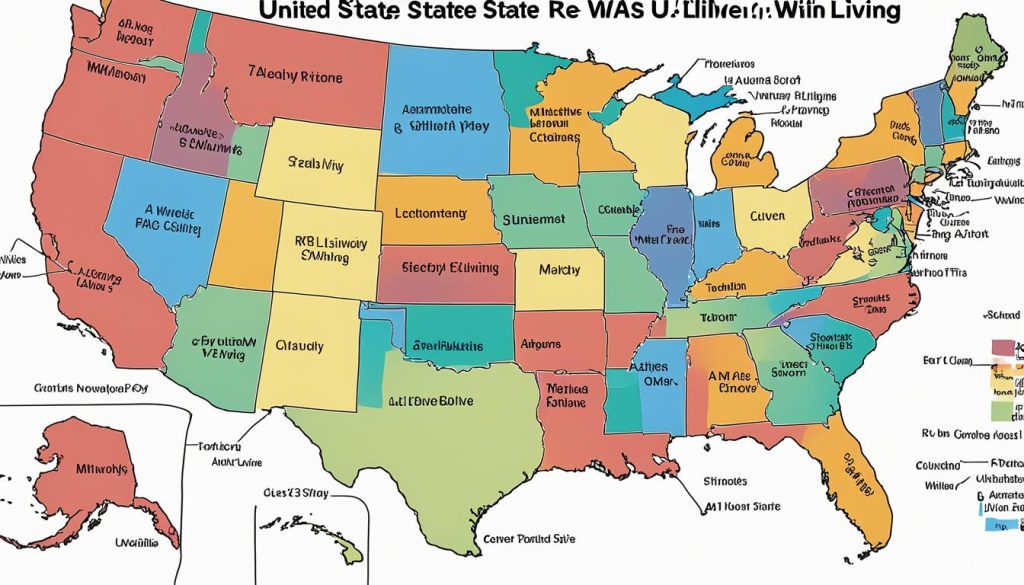
Maintaining Your RV and Managing Repairs
Regular maintenance and prompt repairs are essential for keeping your RV in good condition and ensuring a comfortable living experience. By taking proactive measures, you can avoid costly breakdowns and prolong the lifespan of your vehicle. In this section, we will provide you with expert tips on RV maintenance and repairs, as well as resources to help you manage any issues that may arise during your RV living journey.
1. Scheduled Maintenance
Just like any other vehicle, your RV requires regular maintenance to keep it running smoothly. Follow the manufacturer’s guidelines for routine checks and servicing, including oil changes, tire rotations, and filter replacements. Adhering to the recommended maintenance schedule will not only prevent unexpected breakdowns but also help maintain your warranty coverage.
2. DIY Inspections
Performing routine inspections on your RV can help you catch potential problems before they escalate. Regularly check the exterior for any signs of damage, such as leaks or cracks. Inspect the tires, brakes, and lights to ensure they are in proper working condition. Inside, examine the plumbing, electrical systems, and appliances to detect any issues early on. By being proactive in your inspections, you can address minor problems before they turn into major repair projects.
3. Basic Toolbox and Replacement Parts
Carrying a basic toolbox and a selection of replacement parts can be incredibly helpful during your RV travels. Include essential tools like screwdrivers, wrenches, pliers, and a multimeter. Additionally, keep spare fuses, light bulbs, and plumbing fittings on hand. These simple supplies can enable you to tackle minor repairs on your own, saving you time and money.
4. DIY Repairs
While some repairs may require professional assistance, learning to diagnose and fix minor issues on your own is a valuable skill for RV living. Invest time in understanding the various systems of your RV, such as the electrical, plumbing, and HVAC systems. Online resources, instructional videos, and RV owner forums can provide guidance on common repairs and troubleshooting techniques. However, always prioritize your personal safety and consult a professional if you are unsure or dealing with complex issues.
5. RV Service Centers and Mobile Mechanics
For more complex repairs or if you prefer to leave the work to the experts, RV service centers and mobile mechanics offer professional assistance. Research reputable service centers in the areas you plan to travel, ensuring they have experience working with your specific RV model. Mobile mechanics can come directly to your location, saving you the hassle of towing your RV to a service center. Remember to read reviews and check certifications before entrusting your RV to any service provider.
Remember, proactive maintenance and prompt repairs contribute to the longevity and enjoyable experience of your RV living. By staying on top of maintenance tasks and addressing repairs promptly, you can have peace of mind while exploring the open road.
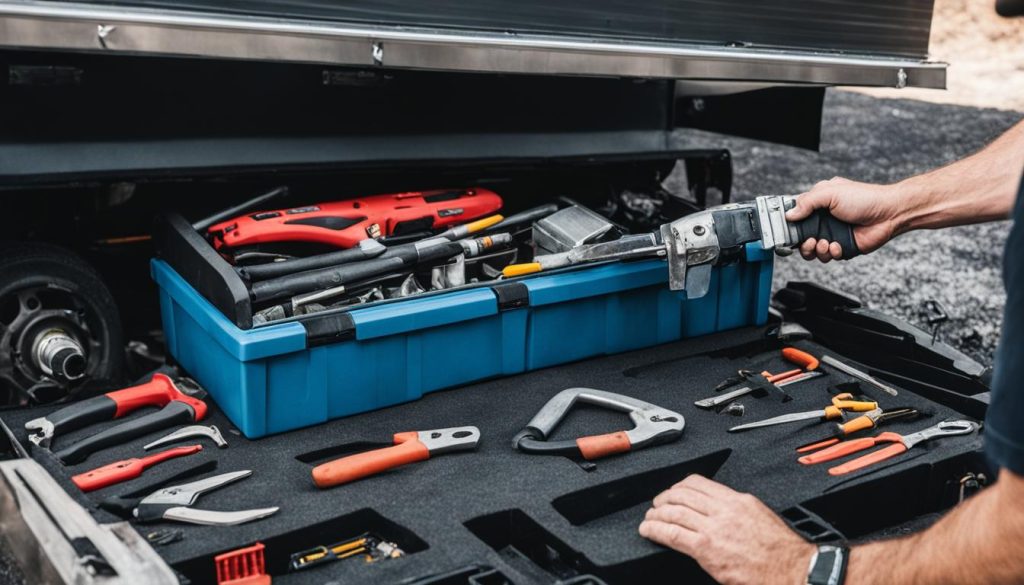
| Maintenance Task | Recommended Frequency |
|---|---|
| Oil change | Every 3,000 to 5,000 miles or as recommended by the manufacturer |
| Tire inspection and rotation | Every 5,000 to 8,000 miles or as recommended by the manufacturer |
| Battery check and cleaning | Every 3 months |
| Roof inspection and cleaning | Twice a year or after severe weather |
| Appliance inspection and servicing | Once a year |
Budgeting for Full-Time RV Living
Budgeting is crucial for successful full-time RV living. When planning your full-time RV lifestyle, it’s essential to carefully consider the various costs associated with this lifestyle. From campsite fees to fuel and maintenance expenses, having a solid budget in place will help ensure that you can enjoy your RV adventures without financial stress.
Here are the key areas where you need to consider budgeting for:
- Campsite fees: Depending on your preferred camping style, you may opt for public, private, or boondocking sites. Each option comes with its own costs and benefits. For public campgrounds, fees can range from $10 to $35 per night, while private campgrounds typically charge higher rates, around $35 to $60 per night. Boondocking, on the other hand, is typically free but may require you to have certain equipment and limit your access to amenities.
- Fuel expenses: Traveling in an RV involves fuel costs, and these can differ depending on factors such as the size and weight of your RV, your travel distance, and the current fuel prices. You can estimate fuel expenses by calculating your average miles per gallon and factoring in the distance you plan to cover.
- RV and vehicle payments: If you have a loan or lease on your RV or tow vehicle, these payments need to be factored into your budget. Be sure to include them when calculating your monthly expenses.
- Groceries: While on the road, you’ll need to budget for groceries and meals. Cooking in your RV can be a cost-effective option, allowing you to save money compared to eating out at restaurants. However, it’s still essential to allocate funds for groceries and meal planning.
- Insurance: Protecting your RV and belongings with comprehensive insurance coverage is crucial. The cost of insurance will depend on factors such as the value of your RV, your driving history, and the coverage options you choose. Be sure to research and compare insurance policies to find the best coverage at the most affordable rate.
- Maintenance and repairs: RVs require regular maintenance to keep them in good condition. From routine maintenance tasks like oil changes and tire rotations to unexpected repairs, it’s essential to budget for these expenses. Having an emergency fund specifically for RV repairs can provide peace of mind and help you avoid financial strain.
Alongside budgeting for these costs, consider strategies for generating income while on the road. Many full-time RVers find ways to work remotely, start an online business, or take on temporary jobs in the places they visit. Having a steady source of income can significantly contribute to your budget and financial stability.
Table: Average Monthly RV Living Costs
| Expense Category | Average Monthly Cost |
|---|---|
| Campsite fees | $500 – $1,500 |
| Fuel expenses | $200 – $500 |
| RV and vehicle payments | $500 – $1,000 |
| Groceries | $300 – $500 |
| Insurance | $100 – $300 |
| Maintenance and repairs | $100 – $300 |
These figures are general estimations and can vary depending on personal circumstances and preferences. It’s essential to create a personalized budget based on your specific RV living style and financial situation.
Finally, establishing an emergency fund should be a priority. Unexpected expenses can arise while on the road, such as major repairs or medical emergencies. Having a safety net of savings will help you handle these situations without disrupting your full-time RV lifestyle.
Please note that these costs are estimates and can vary based on factors such as location, lifestyle choices, and personal preferences.
Embracing the Full-Time RV Lifestyle
Living full-time in an RV is an exciting adventure that allows you to embrace a unique lifestyle. While it may come with its challenges, the rewards are immense. Here are some invaluable tips and advice for fully embracing the full-time RV lifestyle:
One of the greatest benefits of living in an RV is the opportunity to explore new destinations. Take advantage of this by planning trips to places you’ve always wanted to visit. Whether it’s national parks, scenic coastlines, or charming small towns, there is so much to discover. Create a travel bucket list and start crossing off those dream destinations.
While on the road, it’s important to maintain relationships with loved ones and make new connections along the way. Stay connected with family and friends through video calls, social media, and regular updates. Additionally, engage with the RVing community by attending meetups, joining forums, and participating in RV clubs. You’ll meet fellow travelers who share your passion for the RV lifestyle.
Managing the day-to-day challenges of RV living is essential for a smooth and enjoyable experience. Learn to be flexible and adaptable as unexpected situations may arise. Embrace the freedom that comes with a minimalist lifestyle and be open to new experiences. Slow down, savor the simple moments, and fully immerse yourself in the places you visit. Take time to enjoy nature walks, explore local cuisines, and connect with the local culture.
FAQ
How do I choose the right RV for full-time living?
When choosing an RV for full-time living, consider factors such as family size, travel style, budget, and work requirements. Factors to consider include size, layout, tank capacity, and amenities.
What are the benefits and challenges of full-time RV living?
Full-time RV living offers the benefits of adventure, freedom, and the ability to travel at your leisure. However, it also requires careful budgeting, maintenance, and adaptability.
How much does full-time RV living cost?
The costs of full-time RV living include campsite fees, fuel, RV and vehicle payments, groceries, insurance, and maintenance and repairs. Budgeting and planning are crucial to managing these costs.
How do I establish domicile as a full-time RVer?
To establish domicile, you can use a family member’s address or a domicile service. It is important to consider legal obligations and rights, such as insurance, mail management, and homeschooling laws.
How do I maintain my RV and manage repairs?
Regular maintenance and prompt repairs are essential for a comfortable living experience. Carrying a basic toolbox and small replacement parts can be useful. RV service centers and mobile mechanics are also available.
How do I budget for full-time RV living?
Budgeting is crucial for successful full-time RV living. Consider costs such as campsite fees, fuel, groceries, insurance, and maintenance and repairs. It is important to establish an emergency fund for unexpected expenses.
How do I plan my RV lifestyle?
Planning your RV lifestyle involves determining travel routes, booking campgrounds, and managing your budget. Tips include choosing the best campgrounds, managing your budget, and creating a safe and fun RV route. Flexibility is also important.
How do I embrace the full-time RV lifestyle?
Embracing the full-time RV lifestyle involves traveling to new destinations, maintaining relationships while on the road, and managing the day-to-day challenges of RV living. Embrace new experiences and fully enjoy the places you visit.

